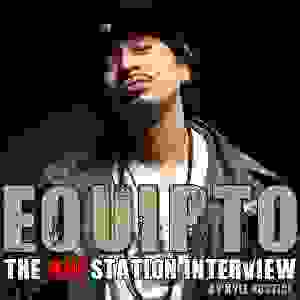
Equipto: The RAPstation Interview
By Rapstation Editor for Rapstation.com
Equipto
The RAPstation Interview
By Kyle Eustice
Best known for his Horns and Halos series with fellow Bay Area rapper Andre Nickatina, Equipto (real name Ilych Sato) graced the mic for the first time in the 1990s. When he was 14, he did his first show for a rollerskating party in Golden Gate Park with a few friends of his, who would eventually form the group Bored Stiff. From there, he stayed focused on making music his career. His first album, 1999's Vintage Volume One and the subsequent Vintage Volume Two and Three, eventually gained the respect of several local artists, including Andre Nickatina. The two paired up for 2002's Midnight Machine Gun Rhymes and Alibis and it was on from there. Horns and Halos dropped in 2005 and was followed up by 2005's Gun-Mouth 4 Hire: Horns and Halos 2 and 2006's Bullet Symphony: Horns and Halos 3. During this time, he was also juggling albums with Bored Stiff and his own solo work. Fast-forward to 2015 and Equipto is still at it. He recently made an appearance on Wake Self's new track, "Different" with former Oaklander and Crown City Rocker Raashan Ahmad while running his label, Solidarity Records. Equipto took some time to talk Bay Area hip-hop, his origins and mainstream hip-hop. Check out http://solidarityrecords415.bandcamp.com/album/phoenix-academy for music.
What's different about Bay Area hip-hop?
I think a lot of Bay Area artist take pride in putting their real life in their lyrics. So it's usually raw, uncut and explicit; not just language and style. It's the whole approach. We have an independent/D-I-Y type of mentality.
How has growing up their shaped your musical style?
It has a lot to do with it. I grew up with the influences of Public Enemy, Big Daddy Kane, and Rakim, as well as Too Short, RBL. Cougnut (RIP) and 415. These were our hometown heroes we were rooting for. So I think the style of production and lyricism just blended like that pretty much. It's kind of like a blend of Gang Starr and CMW's first three albums. That's the epic SF sound to me. The legendary TC is responsible for a lot of that dope production. People might disagree and say the keyboard sound was more SF's signature sound, but not in my opinion.
How did you first get introduced to hip-hop?
My first memories were of Kurtis Blow's "Christmas Rap." My sister (who was fiver years older) and I used to play it all the time. That and "Rapper's Delight," of course. As time went on, I just got more and more into it. I was writing a lot. Then my dad really introduced me thoroughly into hip-hop more, like vinyl shopping and going to shows. My dad took me to see Beat Street at 10-years-old. He's responsible for a lot.
Can you tell me about your relationship with Andre Nickatina?
We did four dope albums together and they belong to a great era in Bay Area hip-hop, in my opinion.
What are you working on in 2015?
I'm trying to focus on our label Solidarity Records. We want to put out dope artists and projects that I feel deserve a certain light or what not. I also want to get together with dope young artists I feel can help shape the future of music and can eventually join some of the greats of this crazy game.
How did you meet Wake and what made you decide to do the song?
I met Wake through a common friend L'Roneous. We toured out there quite
a few times so we've kicked it and got to be cool folks. I respect his artistry. He's dope. He sent me the rough version with just his verse with the hook and I dug it. So I just wrote my verse and sent it back.
What's your stance on mainstream hip-hop?
I don't really appeal to a lot of it. But I believe it serves its purpose as something for the true underground artist to combat. That's how I see it at this point. The raw artist with the true intension to heal will always prevail.
If your fans could take away one message from your music what would you want it to be?
Follow your heart.
What are some of your favorite shows you've attended?
Curtis Mayfield at Slims in San Francisco. Run-DMC at the Coliseum with Whodini and LL Cool J. Public Enemy at the Coliseum when EPMD opened up. I've also seen Sade twice.
What does the music you make mean to you on a personal level?
Somewhat of a time capsule or a journal to show people this is how things were when I was here and how I thought about it; what was important to me on a personal level. I hope someone relates.
Any links you want to share?
Yes, thank you. Our Bandcamp page, which has most (but not all) of our music available to listen and download, and my Twitter and Instagram is both @Equipto. Thank you for the interview!